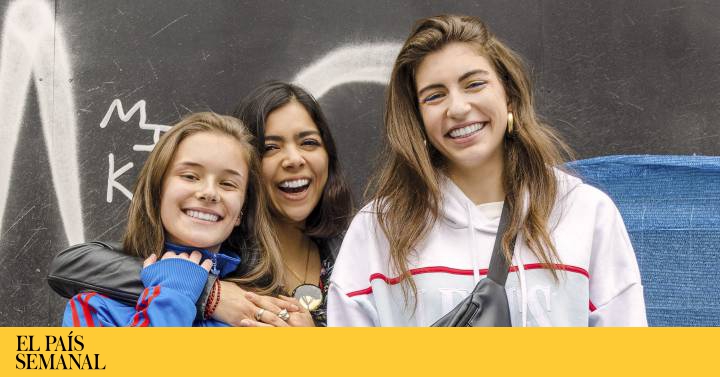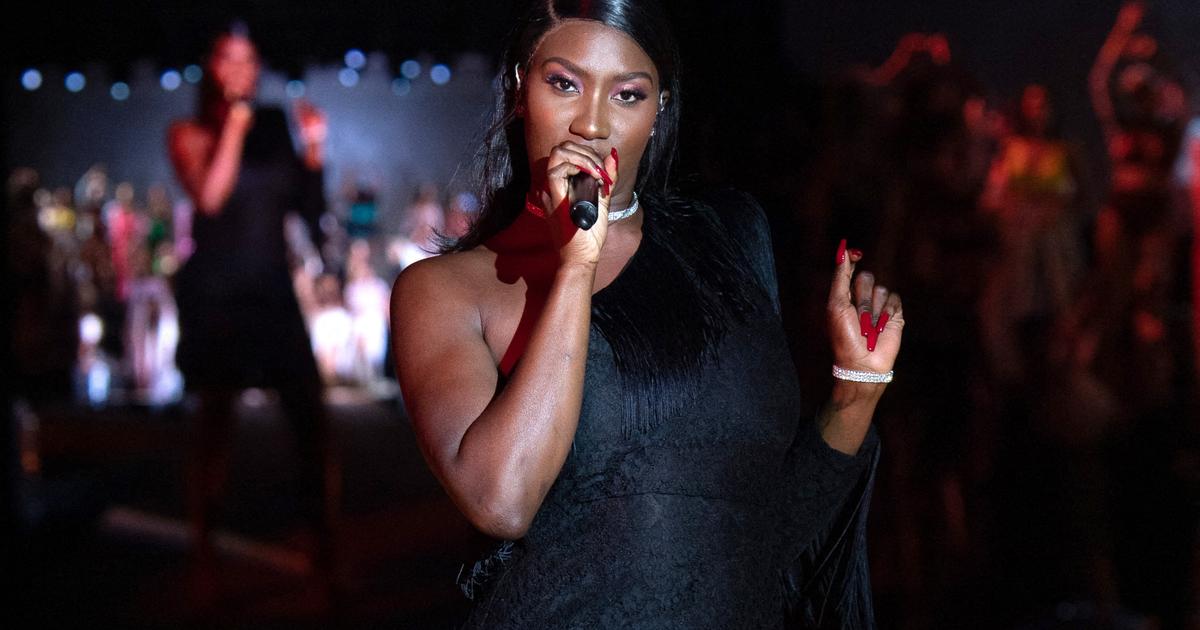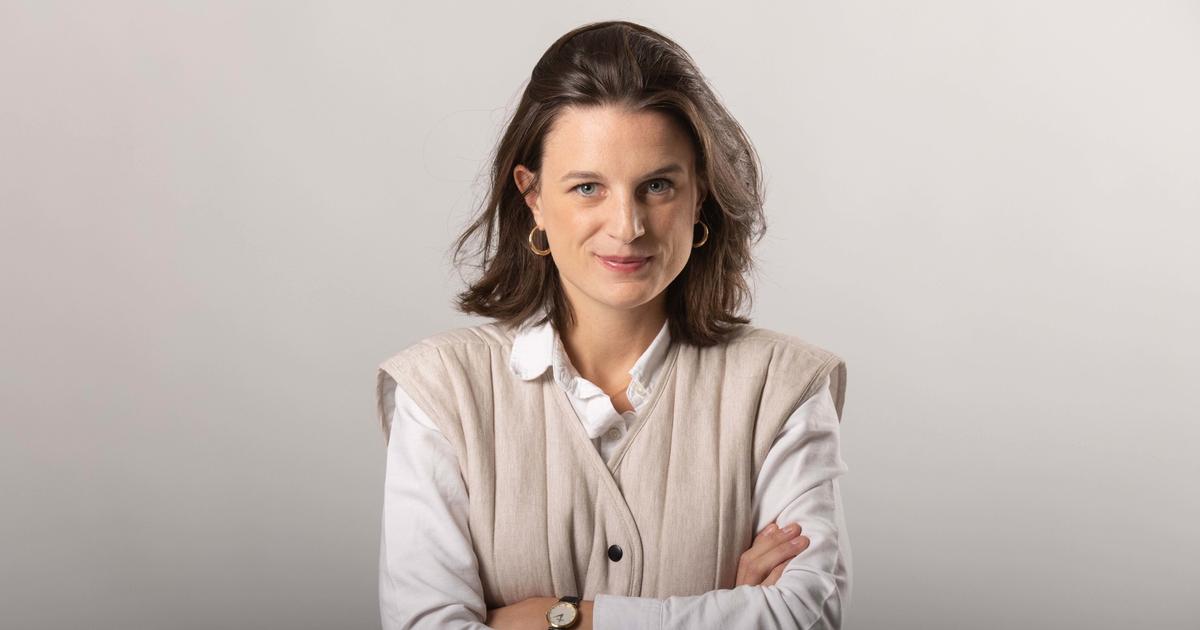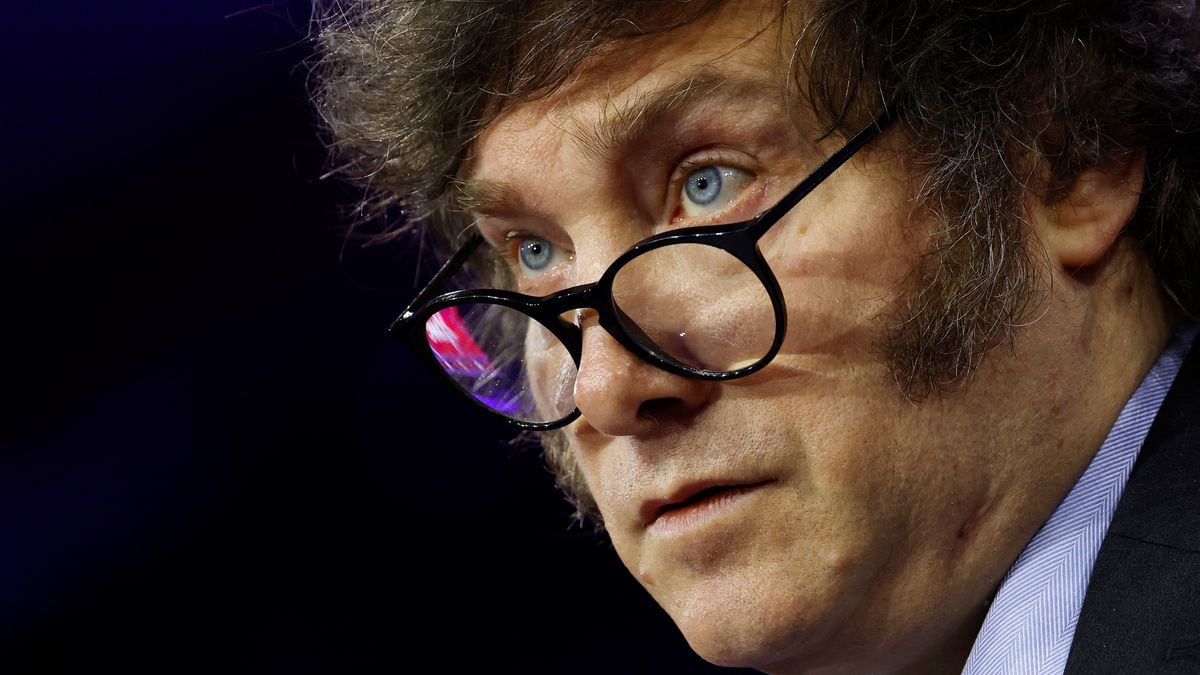They learned from their mothers and grandmothers who they are, but also what they don't want to be. The explosion that the movement for equality between men and women has experienced cannot be explained without those who are still in the institute, take over the Faculties or make their way into their first works. If the majority of women in Spain today declare themselves feminists, among the youngest the trend is skyrocketing. More than half (57%) place their feminist conviction at 8 on a scale of 1 to 10, according to the Diagnosis of Young Women in Spain today (2019) of the Women's Institute. They are the ones that manifest most and who most revolt in the face of machismo. The Weekly Country recently brought together six of these young women in Madrid. They are between 14 and 27 years old. They talk about the road traveled and what remains to be walked. Also what are the margins of feminism, which are much wider than their elders. Two arrive directly from the institute with one of their teachers. Another, rapper, attends the appointment between bolus and bolus, to explain how she defends from her letters another way of talking about women: “Why do you only value them for their beauty, do not look at what is inside their head? ”, He throws at his teammates. From Barcelona comes a cartoonist who has just told in cartoons the transition of his partner from man to woman trans. She, the bride, has also come, but decides not to participate. The fifth comes from the University of Salamanca, where she is an academic and researches about women and disabilities. The group is completed by a feminist activist from the commission that organizes the March 8 demonstrations in Madrid, a scholarship at the university. He claims his Colombian origin and the 19 years he has been in Spain to explain why he is a feminist.
Where are the women of the University?
Mónica Otaola (La Cala de Mijas, Málaga, 24 years old). He participates in a research project on women with Down syndrome and completes his doctoral thesis in interdisciplinary gender studies at the University of Salamanca. He came to feminism for his work, when he began to wonder where are the rights of disabled women, where is his voice. Also because of the influence of his mother, whom he describes as a pioneer. It claims more women in the Academy: “I come from the field of social science, from very feminized careers. When you start to ascend, you ask yourself: 'Where have all the women stayed?' And let's not say in the fields of university power. ” In the Conference of Rectors of the Spanish Universities there are 16 women leaders in front of 60 male rectors, the highest historical figure.
They are young people who were "educated so that they know that they are equal to men," as the writer and journalist Nuria Varela says in the book Feminism 4.0 : "Fourth generation feminists get pissed off when they are not treated as such, but they have confidence to shout loudly. ” In a week, they will take the banners and go to the street. They are the present (and also the future) of March 8. The meeting begins.
MORE INFORMATION
Sara and Diana, story of a couple transition- “I am Cora”, the daily revolution of a 'trans' girl
The discovery
Cintia Gago was soon interested in feminism. "When I started with the turkey more or less," he says very straight on the back of a lounge chair, at the headquarters of the SER chain in Madrid's Gran Vía, where they all talk around a circular table. He is 14 years old and places the specific moment, his "turkey age", four years ago. So he began to hear about the subject with 10 years, in elementary school. Much of what he knows he learned from his older sister, Yaiza, who explained in simple words what a violation is when he was on the news and why it mainly affects women.
Gago learns from his sister and his teacher Amanda Moñiz, who today has left the physics and chemistry classes parked to bring two of her students to the debate. In the classroom he talks about the (few) women who appear prominent in the science books and the importance of claiming that they are more. His other student, Rhojelyn Bolin, a Filipino mother and father from Madrid who studies 4th of ESO, also connected with feminism at age 10. He was discovered “a friend who likes politics a lot,” explains this 15-year-old girl who has been cheated by video games. He wears a black t-shirt in honor of one of his favorites: Life Is Strange . “In primary school, boys don't discriminate against you,” he says. “But when you enter ESO you see his personality change. And you ask yourself: 'But what happened? In just a few months, why have you changed so much? ”
The two youngest are those who researched feminism before. But everyone asked questions about situations that squeaked them well soon. They talk about how boys occupy courtyards and some look badly at girls who also play football. “I already tell you what they call these girls: machonas , because it happened to me,” says Sara Socas (Tenerife, 22 years old). A yellow eyeliner stripe and eyelashes covered with bright blue mascara are painted on his light eyes. He wears tracksuit and big black sneakers.
Feminism as the key to life
Rhojelyn Bolin (Madrid, 15 years old). His mother and father are from the Philippines, a country he has only visited once, when his mother married his stepfather. He has two brothers, a girl of five and another of three. Study 4th of ESO. He has left the closet in his institute. He lived his first manifestation of 8-M two years ago. He loves to paint, from cartoons to anime (Japanese drawing). He wants to devote himself to 2D and 3D animation. He plays the cello in an orchestra, listens to K-pop (Korean popular music) and runs away from macho lyrics: "I prefer to listen to instrumental music to avoid them." Feminism has given him keys to life: "I don't have to get carried away by how people think I should behave."
Socas is the best known of the group, a rap singer whose specialty is improvisation. He left football because in his town he was not well seen. "I regret it, but I ended up giving up rapping sack," he celebrates. She began to ask herself questions when she was insulted for playing and when she was attracted to some girl from the institute: "Things are happening here that seem unfair to me and I think it's not me," he said.
Lina Larrea (Bogotá, Colombia, 24 years old) was also assaulted by questions at the institute. “My process of identity and of living feminism goes through the fact that I am Colombian,” he explains. He was one of the few foreign students in his institute. Its vital route includes several cardinal points in Spain: from Seville to Valencia, from Tarragona to Madrid. "There are elements that are repeated in different cities and in different centers, and you see that it is not you." He claims references: “When I was in school I didn't have them, I didn't feel represented. One of the things that feminism does is to put the invisible on the table. ”
The heiresses
The grandmother of comic artist Sara Soler has always been “butt” with her. Devotionally support the career of this 27-year-old woman born in Barbastro (Huesca), who lives in Barcelona and came to feminism since her LGTBI activism. Grandma Carmen is interested in her cartoons. He devours comics with his granddaughter, who wears short hair and shelters from the cold of mid-February with a red coat. One of his favorites is Maus , Art Spiegelman's story about Nazi Germany, starring cats, mice and pigs. "He has read up manga!" She says. Her mother painted and also supports her.
A woman in the feminist revolt of 2020
Lina Larrea (Bogotá, Colombia, 24 years old). He studied Geology and is currently researching with a scholarship from the Autonomous University of Madrid. She is a feminist activist, member of the 8M Commission of Madrid, one of the groups that have moved the feminist strikes of recent years and organized the “feminist revolt” of this 2020. She claims her vital career as the daughter of an immigrant woman to the that, as a child, I hardly saw once a week during the eight years she worked as an internal maid. Among the authors that follows is the African-American writer Audre Lorde, which highlights a phrase: "It is not our differences that divide us, but the inability to accept those differences."
Soler, like other young people who were born in the welfare state and have known the economic crisis later, is heiress of women who grew up in the hardship of a postwar period or the limitations of a dictatorship and have wanted their daughters and granddaughters to take off where they did not could. His grandmother, 82, was born at the start of the Civil War. More than half of Spain, especially women, was illiterate. Or poor. Or both things. At school, teachers told their father: "This girl has a lot of potential." The man replied with a slight: “If it is more silly than stones; this, to plow the field ”.
The family of the other Sara, Sara Socas, discovered a peculiarity of the grandmother when she was very old: “My mother realized many years after she hated cooking. I hated it. And he has spent his whole life cooking. I did it because I had to. ”
Mónica Otaola, 24 years old and born in La Cala de Mijas (Málaga), is the first university of her family. This political scientist who investigates women with Down syndrome looks at the reflection of her mother, Sari, the main feminist inspiration for her. "She has always been an independent woman," she says as her red flower earrings move. Sari is 60 years old and with 30 he left town to London because he knew it would be good for his professional development. He set up a women's company almost about to give birth to Monica: "It's like many women of that time, always at the forefront of everything."
Sara and Diana: history of a gender transition as a couple
Sara Soler was born in Barbastro (Huesca) 27 years ago, is a comic book artist and teaches classes. Diana Franco, from Barcelona, works as an illustrator of board games also at 27. They have been a couple for nine. When they started, Diana wasn't called Diana nor was she the trans woman she is today. Eight years ago he made the most difficult confession to his partner. She felt like a woman and wanted to transition, as they say in jargon. She calls it "event" or "process." “He gave me his unconditional support,” he says this February morning sitting on the Gran Vía in Madrid, while the rest of the calls pose for group photos: “There are trans people who unfortunately have to travel all that trip alone.”
Read the full story.
They and sex
"I have a question for you: is female masturbation still taboo?" The rapper Socas questions the two teenagers. Rhojelyn Bolin picks up the gutter. It is a subject he barely talks with his classmates, but with his best friend: "Once he told me he was masturbating, his mother came and caught her." He reacted ojiplática : “I will pretend that I have not heard anything. I will continue with my things. ”
The youngest are more active in sex, but also more aware of the risks according to the aforementioned report of the Women's Institute and the 40dB company. Its range to define itself is broader. 74.4% of those between 18 and 24 years are declared heterosexual, the lowest percentage between that age and 34 years. Among the rest, bisexual (6.9), pansexual (2.3) or homosexual (1%). Only one in five confesses self-conscious when talking about their sexual relations. Among the six participants, the theme flows the same as when they talked about their grandmothers or their mothers.
"To what extent has a 40-year-old woman been able to tell her husband what she likes?" Do they talk during sex? Said Sara Soler. Because I am with my partner and I can say: “I like this, no, like this or that way. We are going to use sex toys. ”
In addition to working in the comic and teaching, he collaborates in an “erotic-inclusive” magazine called Sextories. He says that some of his under-age students the magazine is bought by his parents: "It's better than watching crappy porn on the Internet." Rapper Sara Socas is right. And remember how when the case of La Manada was uncovered - five men raped a young woman in a Pamplona portal in Sanfermines 2016 - one of the featured searches on the Pornhub porn video portal was about that violation. "How can the kids be so sick?" He asks. She, the porn for girls she has seen, is not interested: "I see it and I give my ass ... They rub and are already screaming." It doesn't seem to be aimed at women who like other women: "It's for them."
The margins of feminism
There are debates on. One of the most bitter now, raised by prominent feminists, rejects the openness to feminism of the queer movement, which defends that gender and sexual orientation do not correspond to biological nature, but are a social construct. They consider that "invisible" to women, that defending that gender is a personal option shakes the foundations of feminism, which are the struggle against their privileges to their detriment. If everything is feminism, they defend in the end, nothing is.
The debate has no place in this group that speaks in front of a cafe. All nod to the question of whether trans should be within feminism. "Sure, they are women," Rhojelyn replies. “It is his decision. What do you have to do with whether he wants to change or not?
A rapper in cock battles
Sara Socas (Tenerife, 22 years old). Rapper and senior student of the Journalism and Audiovisual Communication degree. He lives in Madrid, in a shared flat. It is comfortable among the interpreters with whom it rapps. It is a masculine world, he describes, but he feels treated "equally". In the battles of roosters (musical duels) in which he improvises mixed matters that he does not like: “But why is the fact of being a woman used as a defect?”. However, he assures that there are things that are changing even if it costs: "They are beginning to rhyme in feminine, which they had never done before." He has rejected the events for those who have called him on March 8. He wants to be free to go to the demonstration.
On one side of the room, in silence, is Diana Franco, trans and partner of Sara Soler. He has come to the meeting, but prefers not to participate. He then explains that he feared that some of the participants, whom he did not know, would feel invaded. "The theory I know, I'm a woman and I'm not invading anything, but one thing is the theory and another reality." She is shy and complex to highlight her "very masculine" voice in the middle of the conversation.
Soler speaks in the debate "as a vital companion of a trans person" about Diana Franco's fear of environments where they can discriminate against her. And he gets angry at those who point out that there are men willing to make the transition to fill the positions of some women: “Do you think that a person who was born a white man in a modern society is going to take and become a transgender woman, the last shit in the society chain, for fun? ”
“I do not conceive a feminism if it is not open, a feminism from the margins, which includes the margins,” adds Mónica Otaola. His academic specialty led him to discover women with disabilities. He realized the “brutal” discrimination they suffer: “We lack diagnosis about how many women with disabilities suffer gender violence or how many without disabilities acquire it after being precisely victims of that violence. Today they continue to practice forced sterilizations. ”
The future
The World Economic Forum warned, already in 2017, that it takes more than a century to achieve real equality between men and women. If the prediction is correct, neither these young women nor probably those who will come right after will live it in full plenitude. “I would like this to continue like this, every day a little more and a little more,” asks Cintia Gago, eager for her 14 years to get “the equality of everything”. If you look 15 years ahead, you look independent, away from home making your life, maybe even out of Spain. He does not consider being a mother.
New banner for 8-M
Cintia Gago (Madrid, 14 years old). 3º ESO student. He became fond of rap and feminism thanks to the influence of his older sister, Yaiza, who works as a professor of aerial fabrics and acrobatics. He goes to dance classes, he likes hip-hop . He has not yet been in any manifestation of 8-M. "My mother has never left me." This year he wants to go with his cousin, who is 20 years old. She is sure she will convince her mother. In his banner he will say: "Mom, if it's my turn tomorrow ... I want to be the last one".
“I want a world in which to make my decisions freely, without micromachisms or micro-aggressions,” wishes Otaola. "We will be better than now, to the dominant positions will come the young generation of now, more cultured in feminism and inclusiveness", predicts Soler. They laugh halfway when she reflects on the interviews and talks about her work that remains to be done: “I would like to continue publishing comics and that the questions they ask me are not: 'Are you going to have children?' It's a comic talk, ask me about my comics! ”
"The future is a bit hard for us," predicts Lina Larrea. “Neither every advance is lasting, nor any reactionary wave could with us. We have to keep going together, partners. ” Remain to meet again in 10 years, to see how much things have changed.









